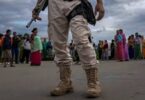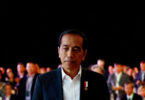F.P. Report
WASHINGTON: Secretary of National Defense Philippine Delfin Lorenzana has said that the Philippines and the U.S. have shared a long history spanning over 70 years as friends, partners and allies. Our cooperation has expanded in the areas of political, economic and social/cultural relations, and our ties, including that between our defense establishments, have continued to grow stronger.
As we commemorate the 70th anniversary of our alliance and the significant (inaudible) establishment of our diplomatic relations, the Department of National Defense welcomes the visit of Secretary Lloyd J. Austin III of the United States Department of Defense and his delegation to Manila as a timely opportunity to advance mutual interests between our two countries.
Earlier this year we were able to conduct modified defense exercises, albeit in restricted settings because of the pandemic. We have also accommodated regular engagements and high-level visits of U.S. military officials, in accordance with our established guidelines and for joint activities has been sustained and the adapted — adapted well to the current situation. This denotes that no challenge is insurmountable between long-standing allies and friends that are committed to attaining shared goals of regional peace and stability.
The bilateral ministerial meeting that will be held this morning, serves as a platform to discuss the way ahead for the Philippines-U.S. alliance based on the common priorities of our respective administrations. It underscores the significance of the bilateral defense relations between the Philippines and the United States in light of new and emerging challenges that confront our nation.
Before I end this opening statement, last night, after a meeting between Secretary Austin and the President, (inaudible), the President decided to recall, or retract, the termination letter for the VFA. So the visiting force (inaudible) force again (inaudible) and we are back on track, Mr. Secretary, to apply for diplomatic (inaudible).
Secretary of Defense LLOYD J. AUSTIN III also spoke on the occasion and said that Secretary Lorenzana, for your warm welcome, and thank you to the Filipino people for your hospitality.
I’d like to start by offering my deep condolences for the tragic military plane crashes in late June and earlier this month. Our deepest sympathies go out to those who were injured and to the families of those who were lost. We continue to stand with the Philippines during this difficult time, and we will continue to support your response.
Now, it’s a privilege to be here during my first visit to Southeast Asia as Secretary of defense, and I’m glad to have the opportunity in person to reaffirm our shared commitment to the U.S.-Philippines alliance.
The Philippines is a vital treaty ally, our oldest in Asia, and an equal and sovereign partner. This year we mark the 75th anniversary of our diplomatic relations and the 70th anniversary of our mutual defense treaty. So it’s an especially good time to work together to advance our already robust defense cooperation. And on behalf of the U.S., let me thank President Duterte for his decision to fully restore the Visiting Forces Agreement.
Our countries face a range of challenges, from the climate crisis to the pandemic, and as we do, a strong, resilient U.S.-Philippines alliance will remain vital to the security, stability and prosperity of the Indo-Pacific. A fully restored VFA will help us achieve that goal together.
Today, Secretary Lorenzana and I had a productive discussion on additional ways to further deepen our long-standing cooperation on several security issues important to both our countries. At the top of my agenda was finding ways to enhance and reinvigorate our alliance and our mutual defense treaty. These include maritime cooperation, support to further modernize the armed forces of the Philippines, and investments that will help the Philippines navigate the region’s complex security environment.
We also discussed our counterterrorist cooperation, an especially strong area of common support. The United States has supported the counter-insurgency effort in Mindanao since 2000, and we now provide support to the only named operation in the Indo-Pacific, Operation Pacific Eagle-Philippines.
I also reaffirmed America’s commitment to supporting a sovereign and secure Philippines and to building an even more capable alliance together. We also talked about how we can work toward a free and open Indo-Pacific rooted in a rules-based international order, a region in which countries work together to realize your highest aspirations and to safeguard the rights of all of your citizens. And I underscored my belief that as democracies with shared values, it is important that we protect the rights of our citizens.
Now, I’m especially grateful for our long-standing U.S.-Philippines Visiting Forces Agreement, which enables us to respond swiftly and seamlessly to disasters or crisis. Thanks to the VFA, the Department of Defense can conduct more than 300 bilateral engagements a year with the armed forces of the Philippines, from expert exchanges to ship visits to component exercises and major training exercises such as Balikatan, which was held this April. And as you know, Balikatan means “shoulder-to-shoulder” in Tagalog, and that’s exactly how we hope our alliance will face the future, because at the heart of this alliance is a relationship built on common interests and values, and ties that bind — and the ties that bind us have been reinforced by a shared history of service and sacrifice.
You know, coming here is personally very powerful for me. My father served proudly in the Philippines during World War II as a corporal in the United States Army Air Force. He was one of many — of many American and Filipino service members who fought side-by-side to defeat aggression and secure freedom in the Pacific. And later today, I will visit the Manila American Cemetery, where many of the Filipino and American veterans who fought during World War II are buried shoulder-to-shoulder, just as they served.
And we will continue to stand with the Filipino people, just as we stood together eight decades ago, side-by-side, arm-in-arm, shoulder-to-shoulder, balikatan.






